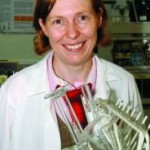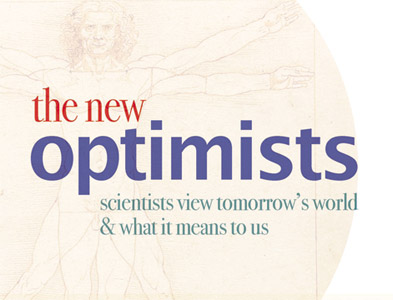Getting to the heart of things
June 19th, 2010
 The necessity for new vaccines is urgent and evident. Despite humanity’s success in eradicating smallpox, two other infectious diseases — malaria and TB, remains tow of the world’s primary killers. The combination of either with HIV is lethal. Infectious agents are also implicated as causes of cancer.
The necessity for new vaccines is urgent and evident. Despite humanity’s success in eradicating smallpox, two other infectious diseases — malaria and TB, remains tow of the world’s primary killers. The combination of either with HIV is lethal. Infectious agents are also implicated as causes of cancer.
There is good news, though says Professor Yvonne Perrie of Aston University. Several laboratories around the world are working on new vaccines and their delivery. Indeed her own research is focused on the advancements and strategic development of drug delivery systems to facilitate effective delivery and targeting of drugs and of vaccines.
Yvonne Perrie is Professor in Pharmaceutics and Drug Delivery, as well as being Head of Pharmacy at Aston University. She is also co-author (with Thomas Rades) of FASTtrack: Pharmaceutics – Drug Delivery and Targeting.
The specific fields of her research are the formulation engineering of vaccines (including conventional and DNA vaccines); enhancing solubility and delivery of bioactive molecules using colloid science and technology; the delivery of drugs, vaccines and gene therapies using liposomes, niosomes and other novel particulate systems; the design, physicochemical characterisation and development of non-viral systems for gene delivery; tissue engineering and regenerative medicine as well as enhancing learning methods in Pharmacy Education.
Tags: Aston University, Cancer, drug delivery, HIV, malarria, pharmaceutics, pharmacology, pharmacy. life sciences, TB, vaccines, yvonne perrie
Posted in Getting to the heart of things, People, Transformations | No Comments »
June 19th, 2010
 In his contribution to The New Optimists, Robin May, a Senior Lecturer in Infectious Disease in the School of Biosciences at the University of Birmingham, and Director of the May Lab, makes an assertion astounding to Jenny Uglow who wrote the Foreword to the book; namely, that we’re about to enter an age when having a copy of one’s own genome sequence is as common as carrying a mobile phone is today.
In his contribution to The New Optimists, Robin May, a Senior Lecturer in Infectious Disease in the School of Biosciences at the University of Birmingham, and Director of the May Lab, makes an assertion astounding to Jenny Uglow who wrote the Foreword to the book; namely, that we’re about to enter an age when having a copy of one’s own genome sequence is as common as carrying a mobile phone is today.
The implications of having the availability of whole genome sequences will usher in an era of truly ‘personal’ medicine, and will shake our understanding of who we really are.
At the May Lab, scientists carry out work to know more about the continual struggle between pathogens and their hosts. This struggle is a major selective force, resulting in the evolution of ever more complex host-pathogen interactions as both sides attempt to ‘win’ the conflict. Scientists here are interested in the molecular basis of such interactions and in how they have evolved.
Tags: biosciences, genome, genomics, infectious diseases, may lab, molecular medicine, pathogens, robin may, University of Birmingham
Posted in Foreword, Getting to the heart of things, People, Transformations | No Comments »
June 19th, 2010
 We can now number of genes, proteins and cells, and we can see their individual shapes in motion. One of the greatest opportunities in biomedical research today is to understand how these various jigsaw bits fit together. Currently, however, says structural biologist Michael Overduin, we have little idea of what the individual jobs are of each protein produced by our genes.
We can now number of genes, proteins and cells, and we can see their individual shapes in motion. One of the greatest opportunities in biomedical research today is to understand how these various jigsaw bits fit together. Currently, however, says structural biologist Michael Overduin, we have little idea of what the individual jobs are of each protein produced by our genes.
His work is to find this out, using computer programmes which scan the surface of each protein and predicts whether it can interact with membranes, proteins or small molecules.
Professor Michael Overduin is Professor of Structural Biology art the University of Birmingham. His research team solve the structures or proteins involved in cancer and infection in NMR Facility in the Henry Wellcome Building.(note: NMR is the abbreviation for nuclear magnetic resonance.)
This HWB•NMR is the UK’s largest NMR facility, providing academic and industrial users with open access to six NMR spectrometers operating at 500-900 MHz, four cryogenic probes and high throughput autosamplers.
Tags: biomedical sciences, cells, Henry Wellcome Building, Michael Overduin, molecular medicine, NMR, nuclear magnetic resonance, proteins, structural biology, University of Birmingham
Posted in Getting to the heart of things, People, Transformations | No Comments »
June 19th, 2010
The capacity to decipher the DNA encoding our genes, and techniques to make antibodies of exquisite mono-specificity are the foundations of modern molecular medicine.
 Experts such as Professor Peter Lane, however, still don’t know how to allow a transplanted organ to survive indefinitely without immunosuppression of the host, but they do know it’s an achievable goal — during pregnancy, the mother ‘tolerates’ the developing child without mounting a damaging immune response. Modern molecular medicine affords us glimpses of the processes that enable this to happen.
Experts such as Professor Peter Lane, however, still don’t know how to allow a transplanted organ to survive indefinitely without immunosuppression of the host, but they do know it’s an achievable goal — during pregnancy, the mother ‘tolerates’ the developing child without mounting a damaging immune response. Modern molecular medicine affords us glimpses of the processes that enable this to happen.
Peter Lane is Professor of Clinical Immunology and the MRC Centre for Immune Regulation, part of the Institute of Biomedical Research at Birmingham Medical School. He works on the molecular and cellular basis of CD4 memory as he believes that understanding these mechanisms will provide important new therapies for human diseases.
Tags: biomedical sciences, CD4, immune regulation, immunology, peter lane, University of Birmingham
Posted in Getting to the heart of things, People, Transformations | No Comments »
June 19th, 2010
 The application of our rapidly expanding knowledge about stem cells will revolutionise the future of medicine, says Jon Frampton, Professor of Stem Cell Biology and Director of the Stem Cell Centre at the University of Birmingham.
The application of our rapidly expanding knowledge about stem cells will revolutionise the future of medicine, says Jon Frampton, Professor of Stem Cell Biology and Director of the Stem Cell Centre at the University of Birmingham.
His Centre covers a wide range of research areas from neural stem cells, skeletal muscle stem cells, tooth stem cells and germ cells derived from embryonic stem cells to studies on 3D materials for tissue engineering. Complementing these research efforts, the Centre also includes a number of members of the School of Social Sciences who help to provide a broad perspective on social and ethical issues associated with stem cell research.
Of his own major research interests, Professor Frampton focuses on the regulation of stem cell behaviour in health and disease. In particular, I am interested in blood stem cells, both normal and those related to leukaemia, although other studies encompass a number of adult stem cell types, for example, those giving rise to bone and fat and the resident stem cells in the heart.
Before coming to Birmingham, he ran research groups in the European Molecular Biology Laboratory in Heidelberg (1988-1995) and the Weatherall Institute of Molecular Medicine at the University of Oxford (1995-2002).
Tags: jon frampton, leukemia, molecular biology, molecular medicine, Stem Cell Centre, stem cells, University of Birmingham
Posted in Getting to the heart of things, People, Transformations | No Comments »
June 19th, 2010
 Scientists are tackling fundamental problems. One of these is population growth, with all the demands on the planet’s resources that will mean. If Professor David Pink is right, developments in crop science, building on the forethought of crop scientists in the last century, may well offer a solution to the problem of feeding the 9 billion of us likely to be alive in 2050.
Scientists are tackling fundamental problems. One of these is population growth, with all the demands on the planet’s resources that will mean. If Professor David Pink is right, developments in crop science, building on the forethought of crop scientists in the last century, may well offer a solution to the problem of feeding the 9 billion of us likely to be alive in 2050.
He currently leads the Crop Improvement Group at Warwick carrying out a multidisciplinary crop improvement research programme in field vegetables (brassica, lettuce, leek and onion) and narcissus.
He has over 25 years experience in breeding research and his current interest is in the development of tools and resources to facilitate the improvement of economically important quantitative traits through the exploitation of natural variation found in older varieties and wild relatives of crops. His research is funded by Defra, BBSRC and industry.
David is a member of the scientific advisory committee of the British Beet Research Organisation, the Defra Plant Varieties and Seeds Tribunal panel, the production sub group of the Defra Fruit and Vegetable Task Force, the Rural Affairs Committee of the BBC, the Defra Sustainable Arable LINK project management committee and is Scientific Adviser to the Field Vegetable Panel of the HDC and a member of the BBSRC pool of expert assessors.
Tags: crop science, david pink, DEFRA, horticulture, sustainability, Warwick University
Posted in Getting to the heart of things, People, Transformations | No Comments »
June 18th, 2010
 Captured in our computers are the inner workings of representative strains of bacterial species that can infect humans or our domesticated plants and animals. Author of The Rough Guide to Evolution, Mark Pallen speaks of the powerful knowledge that this genome sequencing places at our disposal.
Captured in our computers are the inner workings of representative strains of bacterial species that can infect humans or our domesticated plants and animals. Author of The Rough Guide to Evolution, Mark Pallen speaks of the powerful knowledge that this genome sequencing places at our disposal.
Moreover, we can be confident that this new science will enable us to identify the crucial changes in our ancestry that made us human.
Mark Pallen is Professor of Microbial Genomics at the University of Birmingham. As well as The Rough Guide to Evolution, he is also co-author of Bacterial Pathogenomics. The Pallen Research Group benefits from Research-Council funding spanning bioinformatics and laboratory-based projects, with interests focussing on bacterial pathogenomics and type III secretion.
He obtained his medical education at Cambridge and the London Hospital Medical College before completing his specialist training as a medical microbiologist at Bart’s. He held a chair in microbiology at Queen’s University, Belfast before moving to Birmingham in 2001.
In 1996 while completing a PhD in molecular bacteriology at Imperial College, he led a student team to victory in University Challenge.
Tags: evolution, genome sequencing, genomics, mark pallen, microbiology, pathogenomics, systems biology, The Rough Guide to Evolution, University of Birmingham
Posted in Getting to the heart of things, People, Transformations | No Comments »
 The necessity for new vaccines is urgent and evident. Despite humanity’s success in eradicating smallpox, two other infectious diseases — malaria and TB, remains tow of the world’s primary killers. The combination of either with HIV is lethal. Infectious agents are also implicated as causes of cancer.
The necessity for new vaccines is urgent and evident. Despite humanity’s success in eradicating smallpox, two other infectious diseases — malaria and TB, remains tow of the world’s primary killers. The combination of either with HIV is lethal. Infectious agents are also implicated as causes of cancer.













